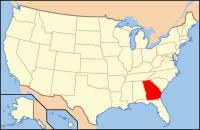Berrien County, Georgia
| Berrien County, Georgia | |
|---|---|

Berrien County courthouse in Nashville
|
|
 Location in the U.S. state of Georgia |
|
 Georgia's location in the U.S. |
|
| Founded | 1856 |
| Named for | John M. Berrien |
| Seat | Nashville |
| Largest city | Nashville |
| Area | |
| • Total | 458 sq mi (1,186 km2) |
| • Land | 452 sq mi (1,171 km2) |
| • Water | 6.0 sq mi (16 km2), 1.3% |
| Population | |
| • (2010) | 19,286 |
| • Density | 43/sq mi (17/km²) |
| Congressional district | 8th |
| Time zone | Eastern: UTC-5/-4 |
| Website | www |
Berrien County is a county located in the south central portion of the U.S. state of Georgia. As of the 2010 census, the population was 19,286. The county seat is Nashville. The county was created February 25, 1856 out of portions of Coffee, Irwin and Lowndes Counties by an act of the Georgia General Assembly. It is named after Georgia senator John M. Berrien.
The citizens of the area of Lowndes County and Irwin County that would become Berrien County had to travel long distances to get the county courthouse at Franklinville, Georgia and later Troupville, Georgia for those in Lowndes County, and Irwinville, Georgia for those in Irwin County. By at least June 1853, citizens had petitioned to form a new county. The 1853 attempt of a new county failed. By 1856, a renewed attempt at the creation of a new county was successful.
Berrien County lost a disproportionate number of men in World War I in part because companies at that time were organized by militia districts at home. Eight weeks before the Armistice, 25 Berrien County men were among the 200 recently enlisted soldiers who perished at sea off the coast of Scotland. Many of the bodies were returned to the soldiers' hometowns for burial, and the names of the dead were engraved on a memorial located on the courthouse grounds in Nashville. The memorial was the first in a series of pressed copper sculptures by artist E. M. Viquesney entitled The Spirit of the American Doughboy.
According to the U.S. Census Bureau, the county has a total area of 458 square miles (1,190 km2), of which 452 square miles (1,170 km2) is land and 6.0 square miles (16 km2) (1.3%) is water.
...
Wikipedia
